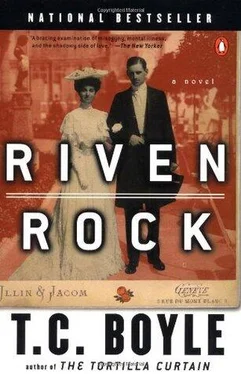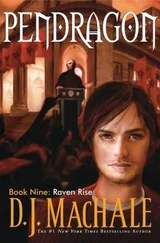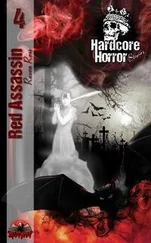T. Boyle - Riven Rock
Здесь есть возможность читать онлайн «T. Boyle - Riven Rock» весь текст электронной книги совершенно бесплатно (целиком полную версию без сокращений). В некоторых случаях можно слушать аудио, скачать через торрент в формате fb2 и присутствует краткое содержание. Год выпуска: 1999, Издательство: Penguin Books, Жанр: Современная проза, на английском языке. Описание произведения, (предисловие) а так же отзывы посетителей доступны на портале библиотеки ЛибКат.
- Название:Riven Rock
- Автор:
- Издательство:Penguin Books
- Жанр:
- Год:1999
- ISBN:нет данных
- Рейтинг книги:5 / 5. Голосов: 1
-
Избранное:Добавить в избранное
- Отзывы:
-
Ваша оценка:
- 100
- 1
- 2
- 3
- 4
- 5
Riven Rock: краткое содержание, описание и аннотация
Предлагаем к чтению аннотацию, описание, краткое содержание или предисловие (зависит от того, что написал сам автор книги «Riven Rock»). Если вы не нашли необходимую информацию о книге — напишите в комментариях, мы постараемся отыскать её.
Riven Rock — читать онлайн бесплатно полную книгу (весь текст) целиком
Ниже представлен текст книги, разбитый по страницам. Система сохранения места последней прочитанной страницы, позволяет с удобством читать онлайн бесплатно книгу «Riven Rock», без необходимости каждый раз заново искать на чём Вы остановились. Поставьте закладку, и сможете в любой момент перейти на страницу, на которой закончили чтение.
Интервал:
Закладка:
The last of the doctors, a leonine general practitioner with white hairs growing out of his nose and ears, was the only one able to reach Stanley — at least at first. Dr. Putnam had been recommended by a friend of Josephine, and though he didn’t know Charcot from Mesmer or Freud from Bloch, in his forty-seven years in the medical profession he’d encountered just about everything, including dementia in all its forms and the secret hysteria that made women hang themselves in closets. He came up the steps jauntily enough, considering he was in his seventies, and before he had his hat and gloves off he’d challenged Stanley to a game of checkers. The two of them played wordlessly through the afternoon and into the evening, and the next morning at eight the doctor appeared with two iron posts and a set of horseshoes under his arm. All morning the posts clanked as he and Stanley studied and released their shoes, and the only other sound was the low murmur of their voices totting up the score.
The next day, the old doctor didn’t appear till nearly three in the afternoon — he’d had to make the rounds of his other patients, he explained, and Mrs. Trusock had kept him with her shingles — but Stanley had been out all morning in a cold wind, flinging his horseshoes at the unyielding stake, over and over again. They played till dark, and then the doctor, warming himself by the fire with a cup of tea before heading home to his wife and supper, called Katherine into the room. She found the two of them drawn up to the hearth in a pair of straight-backed chairs, their knees practically touching. “Stanley,” the doctor said when Katherine had settled herself in the armchair across from them, “you’re as crafty a checkers player as I’ve seen and a deadeye shot at horseshoes. My advice to you, sir, is to find yourself a hobby and pursue it — does wonders for the nerves. Tell me, what do you like, in the way of hobbies, that is?”
Stanley made no reply.
“Nothing?” The old man canted his head, as if listening for a response from the next room. “Well,” he said, smacking his lips over the tea and giving Katherine a quick penetrating look, “I’d prescribe German and fencing lessons. Something you can sink your teeth into. And useful too. Nothing more useful than German in today’s world, and the fencing, well, it will give you some discipline and rigor, and that’s just what you need to take your mind off your troubles. Business troubles, isn’t it? Yes, I thought so.” He set down his teacup with elaborate care and rose from the chair. “I’ll stop in to see how you’re doing in a week or so — and I’ll bring my sabre along too…. Well,” he said, smacking his lips again and looking round the room as if he’d just healed all the lepers of Calcutta in one stroke, “what can I say but auf Wiedersehen!”
For the next several days Stanley was very quiet. Twice Katherine found him out in the yard, brooding over the extemporized horseshoe pit, but when she asked him about it — if he’d like her to play him a match — he wouldn’t give her the courtesy of a reply. One night, soon after, it snowed; Stanley hung the horseshoes on a nail in the basement and never mentioned them again. Christmas came and went — Stanley’s favorite season — and he hardly seemed to notice. He didn’t send out cards, he was so unenthusiastic about the decorations that Katherine and the maid wound up trimming the tree, and their exchange of presents was perfunctory to say the least. They spent a quiet New Year’s mewed up in the house, barely talking to one another, while everyone else was dancing and visiting. Stanley brooded. Katherine was miserable.
At the end of the first week of January they went into Boston, Katherine to see about her research work at the Institute and Stanley to locate and purchase the foils he would need for fencing. They had a late breakfast with her mother and Stanley didn’t have two words to say the whole time, but at least he was tractable and outwardly calm, and then they took a walk down Commonwealth Avenue, just as they had when they were lovers two years before.
Stanley was very solemn and he held himself with a kind of fanatic rigidity, his chest thrust out so far the buttons of his overcoat seemed ready to give way. She tried to make small talk, more as a way of reassuring herself than anything else, but after a while she gave it up and made do with the morning, the briskness of the air and the gentle pressure of her husband’s arm in her own. German and fencing, she was thinking. As ridiculous as the idea had first sounded to her, she’d now begun to warm to it — maybe it would help focus Stanley in the way the checkers and horseshoes had. Maybe the old ghost of a country G.P. knew more than the experts, maybe he was right, maybe he was. Just then, just as she began to feel that things might turn out right after all, Stanley began to drag his foot — his right foot — as if he’d been shot in the leg. She tried to ignore it at first — it was a passing quirk, she was sure of it — but after they’d gone a block, people staring, his foot scraping rhythmically at the concrete, the pressure ever greater on her arm till it felt as if she were supporting his entire weight, she had to say something.
“Stanley, dear, are you all right?” she asked, slowing her pace to accommodate him. “Are you feeling tired? Or cold? Would you like to go back now?”
He pulled up short then and looked at her in surprise, as if he didn’t know how she’d become attached to his arm. His face was working and she had the strangest fancy that he was drifting away from her like a helium-filled balloon and that if she let go, even for an instant, he’d recede into the clouds. “I can‘t,” he said. “You see, I’ve got — got to find a German teacher. That’s where I’m going.”
“But your leg—?”
“My leg?”
“Yes. You were limping. I thought you’d got a stone in your shoe,or—”
He gently disengaged himself from her arm and tipped his hat. “Auf Wiedersehen,” he said, and he went off down the street in a peculiar slouching hobble, dragging his right foot all the way.
It was a repetition of the scene at the pier and she was afraid for him — anything could happen — but she knew enough to understand that she couldn’t stop him now, short of putting a collar and leash on him, and she still fanned that dim little coal of a hope: the German teacher. Of course. Why not? She went on to MIT and at two she took a cab to the restaurant where they’d arranged to meet for lunch, but no Stanley. No Stanley at two or two-fifteen or two-thirty either. She waited until three and then she left a note with the maître d’ and went back to the Institute.
It was dark by the time she returned to her mother‘s, only to discover that Josephine was out, and she settled into a chair with Wallace and read about natural selection amongst the mammalian species of Borneo and watched the clock. Sometime later — at seven or thereabout — the bell rang downstairs and she heard the maid tripping through the hallway to answer it. This was succeeded by a confusion of voices — Stanley’s, she recognized Stanley‘s — and a thunder of footsteps coming up the stairs. She rose from her chair and her heart was flapping like a sheet in the wind: what now?
A moment later Stanley appeared at the parlor door, a slight embarrassed-looking man in a gray overcoat and gold-rimmed spectacles at his side. Stanley had his hand on the man’s upper arm and he wore a look of transport on his face, of rapture, as if he’d found the very key to existence. “My — my German teacher,” he announced.
The man in his grip seemed to shrink away from him. “I’m very sorry,” he said through the impediment of a heavy accent while lifting his eyes to Katherine‘s, “sorry to intrude on you this way.” He looked to Stanley, but Stanley was oblivious. “My name is Schneerman, and I teach at the Deutsche Schule, and, uh, this gentleman, your husband, I take it, well — he was very persuasive. I give him my card. I tell him that I am expected home to dinner with my wife — and here his voice cracked—”and, and my children, but he is very insistent.“
Читать дальшеИнтервал:
Закладка:
Похожие книги на «Riven Rock»
Представляем Вашему вниманию похожие книги на «Riven Rock» списком для выбора. Мы отобрали схожую по названию и смыслу литературу в надежде предоставить читателям больше вариантов отыскать новые, интересные, ещё непрочитанные произведения.
Обсуждение, отзывы о книге «Riven Rock» и просто собственные мнения читателей. Оставьте ваши комментарии, напишите, что Вы думаете о произведении, его смысле или главных героях. Укажите что конкретно понравилось, а что нет, и почему Вы так считаете.












